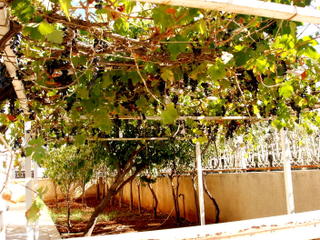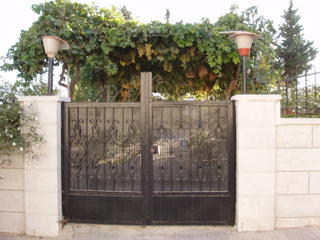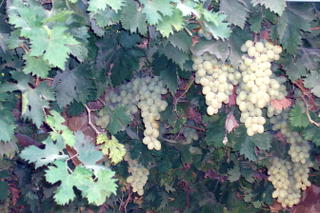The weather in Amman is amazing I will give it that! Every day I wake up to hot, intense sunshine. I noticed today I was still squinting even with sunglasses! Usually there’s not a cloud in the sky and there is no humidity so the heat is reasonable, and drops considerably at night.
I’m living in a section of the city called Khalda. Amman was originally built on seven hills (called jebels) and so the city is divided into those sections, Jebel Amman being the oldest, is generally referred to as ‘downtown’ by Jordanians. However, this does not mean ‘downtown’ in the conventional sense of the word, and most local people don’t go there at all. At this point it is mostly a tourist attraction, with the stone amphitheater, a small museum, and, of course, a vast array of street vendors trying to sell hookas, jewelry and food of all varieties at three times the usual selling price.
I of course made Mohammad take me down there and show me around. He gave me a grand tour despite the crowded streets and oppressive heat, and even passed me off as a half-Jordanian for reduced admission to the amphitheater :-)
While some of the vendors have actual shops, many people just lay their wares out on tattered blankets in the street. Interestingly enough several of those blankets were covered with people selling the old Iraqi currency with Saddam on the front.
There are a LOT of Iraqis in Jordan. During the first war and the second war Jordan opened its borders for Iraqis to enter seeking refuge. I think the theory was to provide a safe-haven while the fighting occurred and then everyone could return home. Unfortunately that is not how the situation unfolded and a huge influx of Iraqis with large quantities of cash have poured into Jordan, drastically driving up the cost of housing and increasing the rapid depletion of Jordan’s VERY limited natural resources (like water!). Most of the Jordanians and Palestinians I have spoken with have voiced their displeasure with the increasingly long-term presence of the Iraqis, especially the ‘type’ of Iraqis that have come (everyone makes clear that they like the Iraqis as a whole but the population that has come to the city a bit different). I unfortunately can’t tell the difference yet, either in appearance or accent, between the Jordanians, Palestinians, or Iraqis, but a lot of times we will go somewhere and the people I’m with will say there are Iraqis everywhere (like downtown, or in one of the local malls).
Jordan has even recently passed a rule stating that in order to attend school your parents must have legal residence in the country because the school system is so overstressed and overcrowded by the influx that it cannot handle all the students. There are apparently more than a million Iraqis officially in the city and that means there are at least twice that many in reality. Crazy. Anyway, enough about that...
So Amman is divided in half really, east and west, with the east being the older (poorer) section and the west being more modern (for example, the section I live in, which didn’t even exist 15 years ago). The city has doubled in size and is projected to do so again by 2025. There are construction sites everywhere (and mostly Egyptian and Iraqi workers, I think they are basically like Mexicans in the US).
There is a big building going up right across the street from my office, I can watch them working out the window, we are on the second (meaning third, since it is GF, 1, 2, etc) and have one whole wall of windows.
The guys have been nice enough to designate Mohammad’s office as ‘the smoking room’ and most of the time it is just me and Mohammad or Tuhamie. In the beginning it was Tuhamie and I in the mornings, then Mohammad in the afternoons, but now school has started and Tuhamie is teaching in Zarka (the neighboring city to the north, where he lives) so he isn’t at the office until late afternoon.
Here's a picture of Tuhamie in our wing of the office, which has three rooms in total, plus a small kitchen and bathroom.

Tuhamie is great, I have spent a lot of time with him at work and last weekend I went to stay with him and his wife (and her extended family) in Zarka. Family is a
really big deal in Jordan and many families share buildings, with for example the parents on one floor with the married children on the floor above and the unmarried still living with the parents. Unmarried men and women stay at home until the day they are married. This has nothing to do with age, sex or religion. I have met men and women, Muslim and Christian, hardworking and living at home. Moreover I have been told that it would be incredibly strange and suspicious for anyone to move out (i.e. what would you be doing that is so scandalous or what is wrong with you that you are not with your parents?) to the point that any woman not living at home is ‘tainted’ and even women who leave home to attend universities abroad or in other regions are subject to heightened scrutiny.
I spent some time trying to explain how virtually the opposite is true in America (i.e. people wonder what is wrong with you if you are living with (mooching from?) your parents). Needless to say it was received with some shock. And questions like “But who would take care of you if you are sick?” and “Why would you leave your family to be all alone?” I would like to say I had perfect answers, and I tried, but mostly it was one of many enlightening discussions.
Family size is also an issue. Meaning it is a BIG issue that you have a BIG family. My Arabic tutor is one of 12, nine girls, and although the younger families seem to have fewer children, the most important thing is you absolutely must have a boy. This is openly acknowledged and expressed by men and women alike. It even affects names, because once a boy is born, the father is then called, for example, Abu Mohammad, or ‘the father of Mohammad’ instead of by his first name. This is all traditional, and is starting to fade in Amman but is apparently still the case in the villages.
And I actually meant to say more about Zarka, maybe tomorrow (bükra!) but now I have a meeting...*hugs*










